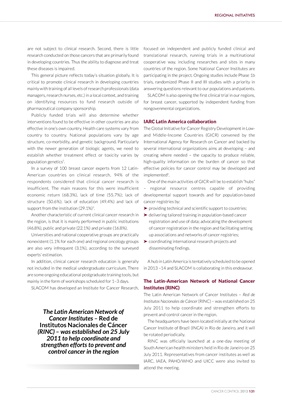
REGIONAL INITIATIVES
are not subject to clinical research. Second, there is little focused on independent and publicly funded clinical and
research conducted on those cancers that are primarily found translational research, running trials in a multinational
in developing countries. Thus the ability to diagnose and treat cooperative way, including researches and sites in many
these diseases is impaired. countries of the region. Some National Cancer Institutes are
This general picture reflects today’s situation globally. It is participating in the project. Ongoing studies include Phase 1b
critical to promote clinical research in developing countries trials, randomized Phase II and III studies with a priority in
mainly with training of all levels of research professionals (data answering questions relevant to our populations and patients.
managers, research nurses, etc.) in a local context, and training SLACOM is also opening the first clinical trial in our regions,
on identifying resources to fund research outside of for breast cancer, supported by independent funding from
pharmaceutical company sponsorship. nongovenmental organizations.
Publicly funded trials will also determine whether
interventions found to be effective in other countries are also IARC Latin America collaboration
effective in one’s own country. Health care systems vary from The Global Initiative for Cancer Registry Development in Low-
country to country. National populations vary by age and Middle-Income Countries (GICR) convened by the
structure, co-morbidity, and genetic background. Particularly International Agency for Research on Cancer and backed by
with the newer generation of biologic agents, we need to several international organizations aims at developing – and
establish whether treatment effect or toxicity varies by creating where needed – the capacity to produce reliable,
population genetics2. high-quality information on the burden of cancer so that
In a survey of 100 breast cancer experts from 12 Latin- effective policies for cancer control may be developed and
American countries on clinical research, 94% of the implemented4.
respondents considered that clinical cancer research is One of the main activities of GICR will be to establish “hubs”
insufficient. The main reasons for this were insufficient – regional resource centres capable of providing
economic return (68.3%), lack of time (55.7%); lack of developmental support towards and for population-based
structure (50.6%); lack of education (49.4%) and lack of cancer registries by:
support from the institution (29.1%) .3
‰ providing technical and scientific support to countries;
Another characteristic of current clinical cancer research in ‰ delivering tailored training in population-based cancer
the region, is that it is mainly performed in public institutions registration and use of data; advocating the development
(46.8%), public and private (22.1%) and private (16.8%). of cancer registration in the region and facilitating setting
Universities and national cooperative groups are practically up associations and networks of cancer registries;
nonexistent (1.1% for each one) and regional oncology groups ‰ coordinating international research projects and
are also very infrequent (3.1%), according to the surveyed disseminating findings.
experts’ estimation.
In addition, clinical cancer research education is generally A hub in Latin America is tentatively scheduled to be opened
not included in the medical undergraduate curriculum, There in 2013 –14 and SLACOM is collaborating in this endeavour.
are some ongoing educational postgraduate training tools, but
mainly in the form of workshops scheduled for 1–3 days. The Latin-American Network of National Cancer
SLACOM has developed an Institute for Cancer Research, Institutes (RINC)
The Latin American Network of Cancer Institutes – Red de
Institutos Nacionales de Cáncer (RINC) – was established on 25
July 2011 to help coordinate and strengthen efforts to
The Latin American Network of prevent and control cancer in the region.
Cancer Institutes – Red de The headquarters have been located initially at the National
Institutos Nacionales de Cáncer Cancer Institute of Brazil (INCA) in Rio de Janeiro, and it will
(RINC) – was established on 25 July be rotated periodically.
2011 to help coordinate and RINC was officially launched at a one-day meeting of
strengthen efforts to prevent and South American health ministers held in Rio de Janeiro on 25
control cancer in the region July 2011. Representatives from cancer institutes as well as
IARC, IAEA, PAHO/WHO and UICC were also invited to
attend the meeting.
CANCER CONTROL 2013 131